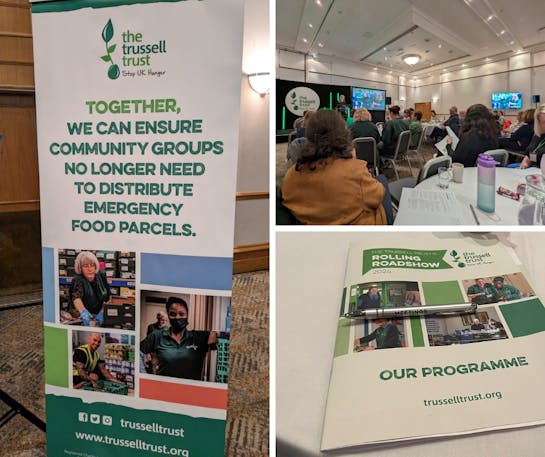
Compassion for people and a passion for change.
Reflections on the Trussell Trust’s Rolling Roadshow in Bristol.

Hosted in central Bristol, representatives from local food banks from across the South West gathered at the 2024 Trussell Trust Rolling Roadshow, to listen to guest speakers, participate in campaign workshops, and hear from the Trussell Trust senior leadership team on how they’ve been supporting work to stop UK hunger, and their aims for the journey over the next five years.
Opening prayers for the morning was led by Rev’d Dr Andy Murray, a local vicar with skin in the game. Opening Bristol Northwest Foodbank in 2011, Andy has been the Chair of Trustees since its foundation. Bristol Northwest has five outlets for food support, as well as a Social Justice Hub which offers services including cookery courses, support for people experiencing homelessness, and a woodworking workshop to help tackle social isolation.
The first session of the day Ending Hunger Together was led by Emma Revie (CEO), and John; a Lived Experience Partner who is a Trustee of his local food bank. John uses his personal experiences to advocate for change as a Policy Advocate who then feeds into the Trussell Trust’s Strategy Group. They spoke about how we can remove obstacles that individuals may face when approaching their local food bank for emergency food support, as well as the wrap around support offered by food banks that often goes far beyond the food parcel. Emma discussed the need to bridge the gap between food banks and their local community, lending us to think about whether our food banks have the right support to offer individuals and young people for the upcoming six-week summer holiday.
Building Bridges Together was led by Chine McDonald, Director of Theos, the Christian Think Tank. Chine began by sharing a rather funny video about the generation gap about the generation gap (and lamb barbeques) and began her talk on how society today seems very fractured and how we as food banks can go about building bridges to close the gaps. Collectively, we looked at the thoughts and feelings of those who access food banks and asked ourselves, ‘what is really under the surface?’ Delegates shared that many seem anxious and face social isolation. Others spoke about the fractured perspectives of community, and the cynicism that things won’t improve. Chine spoke about some of the work that Theos does, and the work of More In Common, led by Luke Tryll, another Think Tank founded following the murder of Jo Cox, MP, in 2016. Overall, Chine reminded us of our shared humanity, leading to a shared purpose, and a shared vision; to be human is to have something to hope for.
The afternoon focussed on next steps in the campaign to secure an Essentials Guarantee within the current social security system. Around five in six low-income households in receipt of Universal Credit are going without the essentials, and food banks are being asked to take action ahead of the General Election. Food banks from across the UK have been encouraged to Lay it all out on the table and to facilitate tablecloth creation sessions where together we can collate personal stories of hardship from people in their communities by writing them down on a tablecloth, highlighting why an Essentials Guarantee is so urgently needed.
In addition to stories of hardship and effects of going without the essentials, people are asked to write down stories of hope; how can an Essentials Guarantee make a positive difference to them and in their local community? Food banks are encouraged to invite local decision makers and Prospective Parliamentary Candidates to get involved and read the messages written by their local community. These Lay it all out on the table events will take place June to August.
The final session Travelling Together, led by Matthew Van Duyvenbode, Chief Strategy Officer at the Trussell Trust, discussed recent statistics. In 2023, 78% of people in the UK said food banks should not exist in modern society. In the South West, 82% of people said food banks should not exist. We were asked to talk about where our food banks have travelled from, and what has been the most significant change over the past few years. The top three responses included; food banks increasing their opening hours, having to buy in food stocks to plug gaps in physical donations, and the increase in services food banks are now offering to people in the community, such as hosting Citizen’s Advice, CAP, social isolation projects, financial inclusion through Pathfinders, and the Organising and Local Mobilisation network.
We discussed the different activities of support that food banks from across the UK offer, including debt advice, housing advice, addiction support, digital inclusion work, and school uniform support. There are some food banks that facilitate these services to the community, while others signpost for relevant support. We closed the session by thinking about the “landmarks” we will see in our food banks that will help us know that we are making progress on our collective journey to stop UK hunger.
Overall, the day was a fantastic opportunity to speak to food banks from across the South West, be that in a city like Exeter or Bristol, or somewhere rural or coastal. These events are great opportunities to share experiences over the last twelve months and to explore the increase in demand for food parcels as well as the holistic and signposting support that many food banks offer to their communities. It was good to see the Senior Leadership of the Trussell Trust fielding questions and also being available to have a chat with over coffee, strengthening the links between the larger charity and the food banks, whose staff and volunteers are on the ground dealing with the real issues day in day out.
